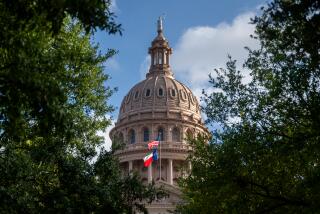Conferees Settle on $397-Billion Bill to Fund Government Into Fall
Congressional negotiators cleared the way Wednesday for passage of a long-overdue $397.4-billion bill to fund much of the federal government through the fall, after first reaching agreement on drought aid for farmers and scaling back efforts to increase logging on federal land.
With Republican leaders endorsing the 1,000-page-plus measure, the bill is expected to pass the House and Senate as early as today and go to President Bush by the end of the week.
The legislation -- consolidating 11 appropriations bills for the 2003 fiscal year that began more than four months ago -- would increase funding for education, homeland defense, the Securities and Exchange Commission and NASA.
But money would be pared back for other programs, such as land conservation and aid to states that jail illegal immigrants convicted of crimes. The latter cut would be a blow to California, which traditionally receives a large chunk of the money.
The cuts were made to satisfy demands by a White House struggling with a ballooning budget deficit and facing unpredictable costs from a possible war against Iraq.
With passage of the spending measure, Congress can turn its attention to other issues, such as the president’s economic stimulus plan and a prescription drug benefit for Medicare recipients. It also can begin work on the 2004 budget.
The agreement came together after Senate Majority Leader Bill Frist (R-Tenn.) and House Speaker J. Dennis Hastert (R-Ill.) intervened to settle a spat within the GOP over drought aid that threatened to scuttle the entire bill.
“This now has become a national defense bill, an anti-terrorism bill, and that makes it even more of a must-pass bill,” House Appropriations Committee Chairman C.W. “Bill” Young (R-Fla.) said after a closed-door meeting of GOP leaders.
The bill reflects the changed post-Sept. 11 priorities of a nation facing threats at home and abroad. It is packed with money for intensified security at ports, more border inspectors and increased research to fight bioterrorism.
But even with the growing budget deficit, negotiators found money for more mundane matters, such as reducing the growing backlog at the Patent Office.
The bill is more than $10 billion above the spending limit sought by the White House. But the administration is expected to support the measure, especially after prevailing in its insistence that money for $3.1 billion in drought aid come from a farm bill passed last year that provides $180 billion to agriculture over the next decade.
The spending bill also would freeze funding for a controversial Pentagon surveillance project to scan computer databases in search of terrorist threats. Before the Defense Department could proceed, it would have to report to Congress on how the project would be implemented and how it would affect civil liberties and privacy.
Sen. Dianne Feinstein (D-Calif.), who has expressed concern about the so-called Total Information Awareness project, said the bill “prevents the program from being used to violate our most fundamental privacy and civil liberties, but does so without impeding our military and intelligence efforts.”
The provision of the spending bill prohibits the Pentagon from deploying the system “against any U.S. person, except as part of lawful U.S. military operations and lawful intelligence activities conducted against non-U.S. persons,” she said.
Facing opposition to the bill from moderate Republicans, a small but important group in a narrowly divided Congress, GOP leaders scaled back a plan pushed by Senate Appropriations Committee Chairman Ted Stevens (R-Alaska) and backed by the timber industry to increase logging in national forests.
They dropped a proposal to exempt Alaska’s Tongass and Chugach national forests from a nationwide ban on road building in such areas imposed by the Clinton administration. Critics feared that lifting the ban would lead to more logging. Also dropped was a requirement that the Forest Service allow timber sales from the Tongass to meet market demand.
But the bill would retain two other controversial provisions. One would create a program to allow the timber industry to harvest prime trees in exchange for its help in managing forests. The other would block legal challenges to an upcoming Forest Service decision on whether more of the Tongass should be declared off limits to logging.
Even with the revisions, Democrats complained that the legislation goes too far in rolling back environmental programs.
Among the biggest winners was the Education Department, which will receive $53 billion, about $3 billion more than the president sought.
The bill also provides $31.8 billion in highway spending, $8 billion more than the White House requested, and $15.4 billion for NASA, $414 million more than the administration sought. Included is $50 million for the investigation into the Columbia space shuttle disaster.
Also winning were the nation’s doctors and, by extension, some of Medicare’s 40 million senior and disabled beneficiaries.
The payments doctors receive from the government for treating Medicare patients were cut 5.4% last year, and were scheduled to go down by another 4.4% on March 1. Some physicians had already stopped accepting new Medicare patients, and a recent American Medical Assn. survey found that more than half the doctors now caring for Medicare beneficiaries would cut back on such care if another payment cut took effect.
House and Senate conferees agreed not only to stop the planned cut, but to increase Medicare payments to doctors by 1.6%, for a total cost of about $49 billion over 10 years.
Bush administration officials, who previously had opposed any adjustments in the fee schedule for doctors, on Wednesday described the 1.6% increase as “not an outrageous amount.”
The SEC was another winner, receiving $716 million, $227 million more than last year, to beef up its policing of corporate wrongdoing.
The National Institutes of Health received the largest increase of any single program in the budget -- nearly $4 billion more, increasing its budget to $27 billion.
In a separate bill passed last year, Congress approved $365.6 billion for the Pentagon. But the new spending bill includes an additional $10 billion sought by Bush for intelligence and military operations.
Among the losers are states, which would receive $250 million to help pay costs of incarcerating illegal immigrants convicted of crimes, down from $565 million last year. Land conservation programs would be cut by $200 million, bringing the total budget this year to $1.1 billion.
*
Times staff writers Vicki Kemper and Elizabeth Shogren contributed to this report.
More to Read
Get the L.A. Times Politics newsletter
Deeply reported insights into legislation, politics and policy from Sacramento, Washington and beyond. In your inbox three times per week.
You may occasionally receive promotional content from the Los Angeles Times.







